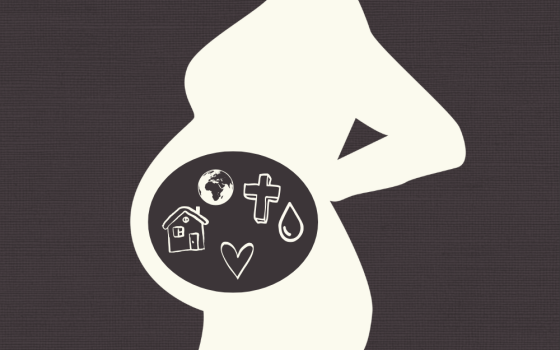Pope Leo XIV, former Cardinal Robert Prevost, greets the crowd in St. Peter's Square at the Vatican after his election as pontiff on May 8, 2025. The new pope was born in Chicago, United States. (CNS/Vatican Media)
It has been an honor and a privilege to be a part of this period of the church's history during which Francis began to lead her out of clericalism, with all its implications. After mourning his departure and treasuring his legacy, we need to look forward. It is time to envision the church of the present and the future, led by Pope Leo.
What do I ask of you?
Without hesitation, I ask you to take the matter of the equality of women, in all aspects of the church, extremely seriously. We urgently need a more inclusive and participatory church, not only in theory as it has been in part since the Second Vatican Council, but in practice with concrete and courageous decisions.
Today, the process of synodality is moving forward, but slowly and with a certain resistance to dealing with burning issues. One, without a doubt, is the female diaconate. Although Pope Francis took important steps regarding the role of women, from the perspective of thousands of women and theologians committed to the church, we affirm that the topic was barely touched upon. The situation of women is not just an agenda item: We are more than half of humanity and more than three-quarters of the people involved in Christian communities. We are not just another topic to be discussed; we are a living part of the church, called by the Holy Spirit to give life, including in ministries.
We do not all want to be priests; believe us. But we all want to be respected, in our dignity and in our vocation that comes from the Spirit.
Exclusion is an ecclesial sin
However, for historical and rather incongruous reasons, we continue to be treated as a problem to be solved. When we ask for our place, we are labeled "feminists," as if it were an insult. Some priests look at us with suspicion, fearing that our abilities will question their authority. Many times, we have been treated with misogynistic attitudes that distort the way of Jesus.
In this Easter season we contemplate the Gospel text about a woman being sent to tell the disciples that He is alive. Is this proclamation, which is the basic condition for being an apostle — having been a witness of the Resurrection — not useful if it is a woman who receives it; and is it useful if it is a man, even if he has not been a witness of the Resurrection, as in the case of Paul?
Jesus trusted women deeply. But that trust was silenced almost from the beginning of the church. Today, we ask you not to be intimidated by those around you. If the Spirit has guided you in so many other matters, why not in this one? Listen to the Ruah that also blows strongly from feminine voices.
We do not all want to be priests; believe us. But we all want to be respected, in our dignity and in our vocation that comes from the Spirit.
I speak to you from real life
Meanwhile, thousands of people are hungry for the Word and for community. Priests, exhausted, try to extend themselves everywhere. And we, with vocation and preparation, remain on the sidelines, watching the bread rotting in our souls because we cannot share it. We are ready. We have theological studies, as well as biblical and pastoral formation. We complement and enrich the mission with our gifts.
Dear brother, Pope Leo, what more does the church need to heal this wound opened by decisions that exclude? The lack of young women in our parishes in Europe is a sign of a church that does not know how to welcome them. They leave, not because they have lost faith, but because they do not find a place that values and includes them. How can the church be the last institution to recognize full equality between men and women?
A structure that no longer supports life
Various sciences tell us that for life to function in a healthy way, there must be a balance between the masculine and the feminine. A theologian — who asks that his name not be mentioned — said that until the church balances this axis which is disproportionately leaning to one side, there will be no church of Jesus. There will be — and has been — a hierarchical institution governed by men.
I recently watched "Conclave," a film about the election of a pope. Seeing that group of more than 130 older, celibate men making decisions for the entire church made my blood run cold. How can such a limited vision represent the God of all? How can we continue to justify having educated and experienced women sitting in the pews, while many homilies and services lack spirit and depth?
Advertisement
A call to evangelical courage
Dear brother, the task is arduous. But the Spirit is strong. The burden you will have in your hands can only be carried if it is guided by that Spirit, which in Hebrew is called Ruah. It is a feminine name.
I ask you, on behalf of thousands of women with a vocation, to listen to the Spirit and be courageous. There will never be absolute consensus, but if this decision comes from the Spirit, God will take care of the rest.
By excluding half the intelligence, creativity and spirituality of the church, we sin against Ruah. We ask you to not be afraid, and to let yourself be guided by Ruah, Who also breathed in the voices, struggles and dreams of women. Do not close your ears to the cry of those who, for decades, have faithfully proclaimed the Gospel, even without full recognition or space.
We know it will not be easy. We know that it will encounter resistance. But we also know that the Spirit does not abandon us, and that evangelical courage always bears fruit.
We, in the reality of daily life, need a brother who treats us as sisters.
We pray that it will be so. Thank you for accepting your ministry.
Count on our prayers, our hope, and our honest and committed words.
This story was originally published in Spanish on May 9, 2025.






